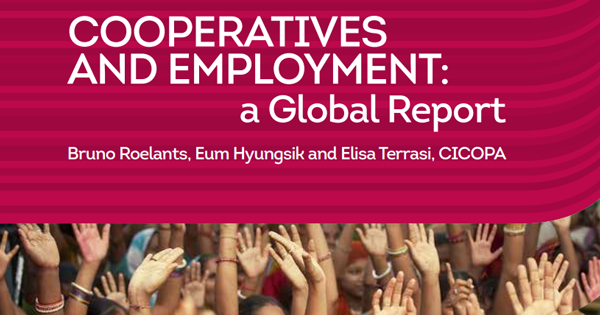First Global Report on “Cooperatives and Employment”
Presented for the first time at the International Summit of Cooperatives on 7 October, with the presence of ILO Deputy Director General Sandra Polaski, the study “Cooperatives and Employment: a global report” carried out by CICOPA, the International organization of industrial and service cooperatives, discusses the significance of cooperative employment in the global landscape, both quantitatively and qualitatively. By piecing up together incomplete statistics, CICOPA has been able to find out that cooperative employment directly concerns 250 million people in the world, without mentioning indirect and induced employment. In the G20, cooperative employment makes up almost 12 % of the total employed population.
However important this estimate may be, it would not be so fundamental if this 12% found in the G20 had no specific characteristics compared to the remaining 88%. Without pretending that all the intrinsic characteristics of cooperative employment are unique to cooperatives, their combination is. Indeed, no other type of enterprise can claim to provide employment to so many people and, at the same time, show such resilience to crises and economic downturns and provide such high employment stability (in many producers’ families, generations), and be characterised by such a balanced distribution between urban and rural areas.
It is even more unique to find out that the above characteristics combined with a specific work experience, as it was explained to us by dozens of workers and producers in individual interviews in different regions scattered throughout the world. Such working experience includes a mix of participation, a family-like feeling, strong identification with one’s enterprise, a sense of pride and reputation, a feeling of implementing values though one’s work, while, at the same time, having a strong, awareness of the economic demands of the enterprise, its need to ’be efficient and flexible. Of course, not all respondents expressed all these components of the working experience with the same strength, but they all proved to experience those aspects in different proportions, at least to some extent. Based on our fieldwork, we obtained some indications that these qualitative components of cooperative employment tends to reinforce the economic sustainability of cooperatives.
The study also shows that worker members considered as the third category of cooperative employment alongside employees and self-employed producers, are already a significant portion of the total (11 million) and exhibit characteristics that are particularly conducive to the economic sustainability of cooperatives.
This is particularly important for CICOPA because this third category of cooperative employment is the main one in the cooperatives of the CICOPA network. It also calls for the development of multi stakeholder cooperatives, in which the staff are involved as one of the key stakeholders, like in the Mondragon group, in italian social cooperatives, and in Quebec solidarity cooperatives, to mention a few emblematic cases.
“Cooperatives and Employment: a global report” ends with a series of recommendations to policy makers and the cooperative movement itself, aiming at better developing cooperatives around the world, and at helping cooperatives meet the serious challenges they are facing under globalized competition. Considering the worsening situation of employment in the world, especially for the youth, governments can ill-afford to look aside when the cooperative movement can offer a significant part of the solution.
Download the report:

